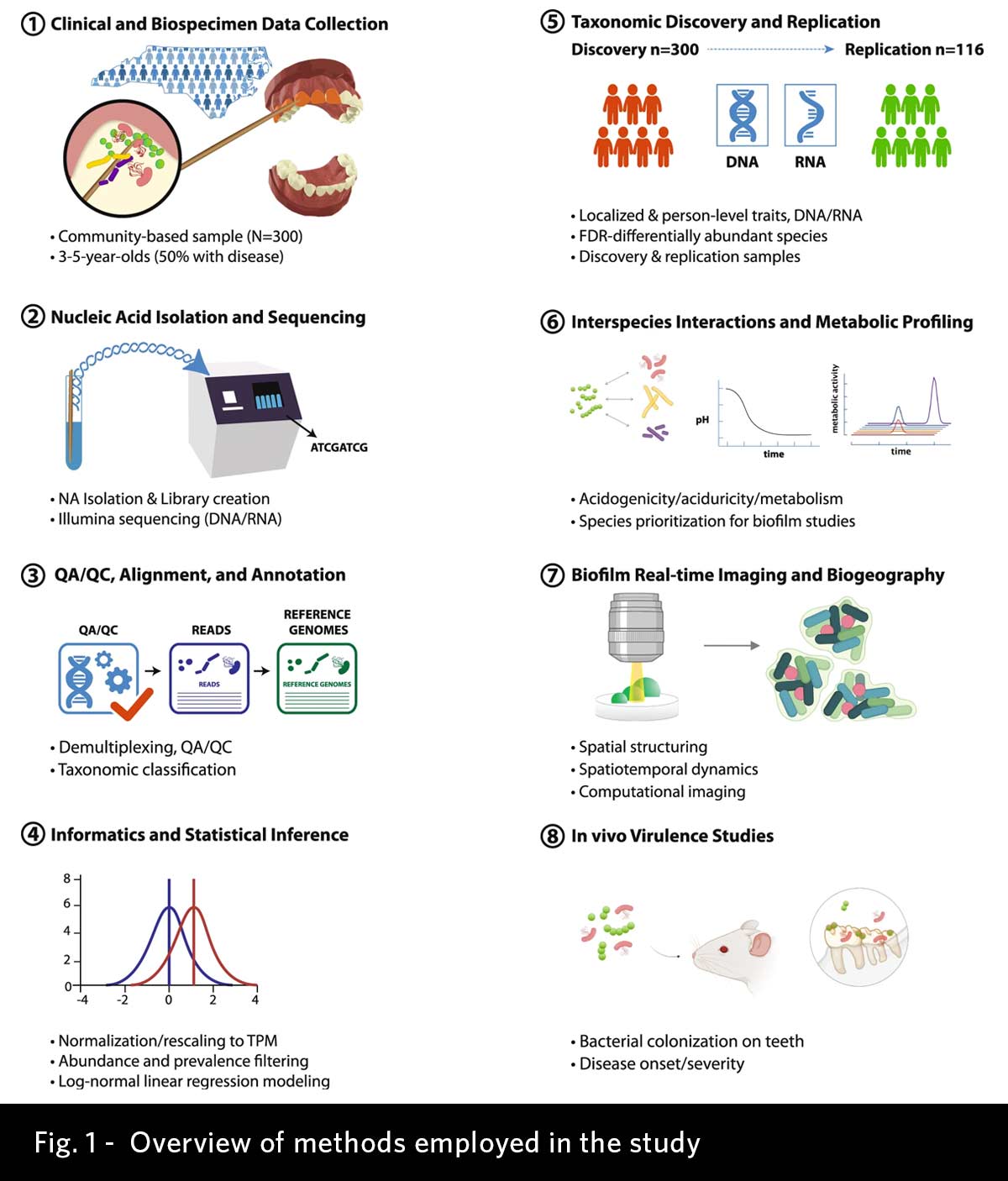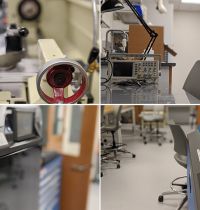UNC clinicians have helped develop AdaptiveSpeech™, a Bluetooth-enabled wireless charging retainer and gaming app, to make speech therapy more engaging for kids born with cleft lip and/or palate.
Using a “smart retainer” and gaming app to make speech therapy fun
UNC clinicians have helped develop AdaptiveSpeech™, a Bluetooth-enabled wireless charging retainer and gaming app, to make speech therapy more engaging for kids born with cleft lip and/or palate.
Rishma Shah, BDS, MSc, PhD
While many children born with a cleft lip or palate may struggle to speak clearly, speech therapy can help them learn how to correctly articulate certain sounds—a vital step toward helping these kids communicate well and live normal lives.
But a few years ago, Rishma Shah, at the time a craniofacial orthodontist at the UNC Adams School of Dentistry, noticed that many of the cleft patients weren't making quick progress toward clearer speech. That's because these kids weren't practicing their home speech exercises, said Lynn Fox, a speech language pathologist at the UNC Craniofacial Center—in large part because it's not exactly thrilling to repeat a rote list of words over and over, day after day.
Lynn Fox, MA, MEd, CCC-SLP
"Kids don't want to practice," Fox said. "It's not fun to practice."
That's why Shah is now developing a new intraoral device paired with a gaming app to make home practice for speech therapy for these kids more engaging and responsive. With the help of a FastTraCS grant followed by funding from the NC Biotechnology Center, she and her colleagues have created a Bluetooth-enabled wireless charging retainer with a sensor that tracks tongue placement along the palate and encourages the correct articulation of speech sounds. Eventually, the retainer will be paired with a smartphone game, which patients will be able to play by practicing their speech therapy exercises—giving these kids motivation and feedback as they learn how to articulate clearly.
Wireless charging of smart retainer
Cleft lip and/or palate, one of the most common craniofacial birth defects, lead to a split in the lip and the roof of the mouth. Treatment plans depend on a patient's specific diagnosis, but often involve multiple surgeries to repair the lip and palate, another surgery to graft new bone into areas of clefting along the teeth by early adolescence, and a variety of orthodontic and other craniofacial treatments at different stages of their lives.
Somewhere along the way, these kids also need to learn how to speak, but their palatal and dental issues can affect the way they learn to articulate even simple sounds. As they learn to speak, some of these children may also compensate for these difficulties by pronouncing sounds incorrectly—such as by using the throat instead of the tongue to create a "T" sound, making it sound more like a "K."
These compensatory ways of speaking can become a habit, which requires long-term, daily speech therapy practice to overcome as these kids learn new muscle memories. But many families do not have the time or money to bring their child into regular speech therapy appointments—and even when these kids do practice their speech exercises at home, they and their parents might be unable to tell whether they're doing those exercises correctly without a speech language pathologist around to troubleshoot. In addition, studies show that consistent, high quality home practice decreases the time spent in speech therapy, reducing the cost and time burden for families.
Shah wanted to know if technology might help her patients overcome some of these barriers. "I was thinking, 'Well, why can't we make something that trains for correct tongue placement needed for correct articulation of speech sounds and do it in a fun way?'" she said.
Retainer seated in the palate
Shah envisioned creating a retainer with a sensor along the palate to help kids learn where to place their tongue while speaking. That's when she first got connected with FastTraCS, the medtech incubator at the North Carolina Translational and Clinical Sciences (NC TraCS) Institute. NC TraCS awarded Shah a FastTraCS pilot grant—and helped her secure additional funding from the NC Biotechnology Center—to start figuring out to how to turn this idea into a reality.
First, the team needed to find the right parts, like sensors that could respond to the pressure of a tongue against the palate, batteries small enough to fit on a retainer and some way to connect the retainer to a phone via Bluetooth. To make matters even more complicated, all these parts had to be waterproof, too.
Yet through this process, Shah and her colleagues were able to build a prototype device with a sensor (along with a rudimentary smartphone app) and conduct an initial feasibility study with a handful of kids. The sensor is placed behind the top front teeth, to help these kids learn where to place their tongues to pronounce sounds such as "T" and "L."
So far, these tests have only looked at whether the device functioned properly, but Fox—who has done patient assessments and speech therapy for the device development process—said that some of the patients and their parents have been encouraged by the idea.
These initial tests also provided the team with some useful feedback. For example, while some of the kids who tested the retainers acknowledged that the device might help them practice their speech, they also said that the retainer was too big to be comfortable, Shah said. As a result, part of the next stage in the device's development will be focused on comfort and further miniaturization of the device.
Long-term, Shah doesn't necessarily want to limit this device to speech therapy for patients with cleft lip and/or palate. Eventually, she envisions a retainer with an array of sensors along the palate that could provide real-time feedback on correct tongue placement for the articulation of many speech sounds.
There's still plenty of work to do before anything like this could become a reality. But in the years since coming to NC TraCS with an idea for a speech therapy device, Shah has now created a working prototype, tested it and received some initial feedback from patients and their parents—in addition to forming a start-up company, OraBiotech LLC, to pursue commercialization. She also credits NC TraCS with introducing her to a wider network of people who've helped to bring this device along the development pipeline.
And helping these children learn how to articulate can be absolutely vital. "If other people are not able to understand a child, there are so many things that go wrong," Fox said. For one, they can't communicate with others. But kids with unresolved speech issues can also see their language skills suffer as they try and fail to communicate—potentially leading to setbacks, Fox noted.
"One of the most important things we do as a human," Fox said, "is communicate with each other."
Rishma Shah, BDS, MSc, PhD, is an associate professor at the Indiana University School of Dentistry and craniofacial orthodontist in the Riley Children's Hospital Craniofacial Center. Shah also remains a research collaborator with the UNC Adams School of Dentistry. Previously, she was a craniofacial orthodontist and associate professor at UNC.
Lynn Fox, MA, MEd, CCC-SLP, is an associate professor with the UNC Adams School of Dentistry and an adjunct assistant professor in the Division of Speech and Hearing at the UNC School of Medicine.
NC TraCS is the integrated hub of the NIH Clinical and Translational Science Awards (CTSA) Program at the University of North Carolina at Chapel Hill that combines the research strengths, resources, and opportunities of the UNC-Chapel Hill campus with partner institutions North Carolina State University in Raleigh and North Carolina Agricultural and Technical State University in Greensboro.


